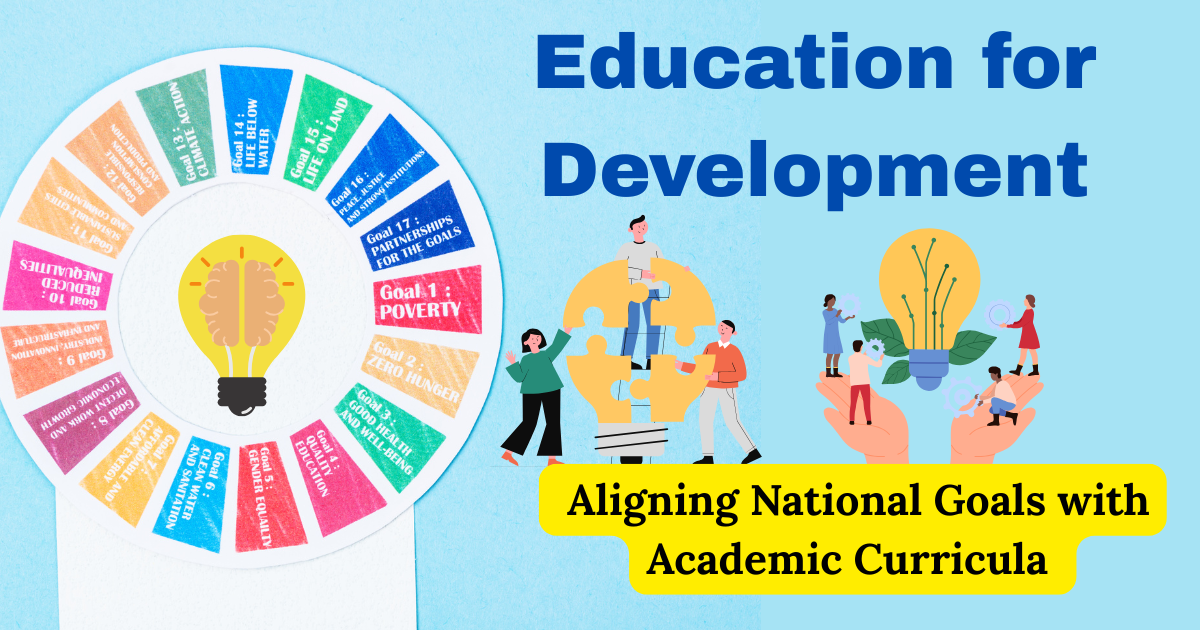Education for Development: Aligning National Goals with Academic Curricula: Education is foundational infrastructure for job creation, and good jobs are the surest way out of poverty. A powerful driver of development, education is one of the strongest instruments for reducing poverty and improving health, gender equality, peace, and stability.
Education for Development
Education also plays a significant role in national development. A well-educated population is important for the economic and social progress of any country. National policies in education focus on ensuring that schools are provided with the necessary resources, teachers, and infrastructure to provide quality education.

The aim is to create an environment where students can access the right kind of education to help the country grow in various sectors like technology, healthcare, manufacturing, and services.
Curriculum Development and Teacher training
The curriculum development is a direct reflection of the education policies that govern the country. In order to align with national goals, schools must ensure that their curriculum is up-to-date, inclusive, and relevant to the needs of students. School heads play an important role in shaping the curriculum by working with teachers, educators, and subject experts to incorporate national education priorities.
Impact of National Goals on School Function
National educational policies have far-reaching implications for the curriculum activities of schools. Schools that align their objectives with national priorities contribute to the broader goals of fostering national unity, strengthening democracy, and developing the necessary skills for the future. Equal opportunity schools play an instrumental role in shaping the future of the nation.
Promoting curriculum alignment in schools
To ensure the full benefits of curriculum alignment, schools should provide opportunities for teachers to engage in curriculum-themed CPD. This can include engaging teachers in developing and reviewing curriculum aims and developing curriculum alignment. This can be provided by collaborative planning observations and group work society.
It would also provide the opportunity for collaborative work on curriculum development or discourse with students. Moreover, curriculum is not static but is constantly evolving (Watermeyer, 2011). Now As time for such discourse can be a constraint in schools, school leaders can support it by providing protected time for curriculum-related events.
When a curriculum is not clearly articulated, opportunities for misinterpretation arise, and these lead to misalignment (Phaeton and Stears, 2017). Non-subject-specific areas such as SMSC (spiritual, moral, social, and cultural development) and PSHE (personal, social, health, and economic education) that are normally delivered as part of the school curriculum should be carefully reviewed and placed in areas where they are best suited.
What is the curriculum in education?
Basically, the curriculum is referred to as a structured set of learning experiences or activities that guides the education process in an academic year in schools, colleges and other institutions. This has everything from lesson plans to instruction.
The curriculum is a very important part of the education system, which is vital to the individual and societal goals in many ways. The framework is for both educators and students, where educators design lessons and students progress to achieve the educational objectives, whereas students follow the curriculum to make sure of their holistic development.
National Goals of Education
Education is intrinsically linked to nation-building. National aims of education focus on fostering unity, promoting democratic values, and contributing to the country’s development.
- National symbols and heritage: Appreciation for the flag, anthem, historical monuments, and other symbols that represent national identity.
- Constitution values: Understanding and embracing the principle enshrined in the Indian Constitution, like justice and liberty.
One of the main goals of national education policies is to foster self-reliance in individuals and the nation as a whole. Education is seen as a means to equip individuals with the skills and knowledge they need to contribute meaningfully to the economy and society.
Conclusion
In this article we discussed education for development: Aligning National Goals with Academic Curricula: Education is foundational infrastructure for job creation, and good jobs are the surest way out of poverty. National educational policies have far-reaching implications for the curriculum activities of schools. The aim is to create an environment where students can access the right kind of education to help the country grow in various sectors like technology, healthcare, manufacturing and services. For more information, you can visit the website.
